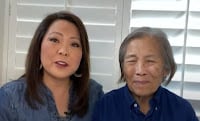
CBS VIDEO + TRANSCRIPT:
Bans on visitors at senior facilities , fewer people dropping in at home, and social distancing may be harsh and confusing for people living with dementia. See tips on beating the stressful social isolation triggered by Coronavirus.
While most of us understand the need for social distancing, it can be a difficult concept to grasp for those living with dementia – the umbrella term for people who have memory loss or significant decline in thinking and reasoning.
As a lot of you know, my mom has Alzheimer’s Disease – the most common type of dementia. She is open about it and we even did a story a few months ago on her diagnosis, thought sometimes she forgets she has been diagnosed.
She lives with me and my family, but the self-isolation, and having to stay at home is creating some confusion for her. It’s also creating stress and confusion for many people who live in memory care or assisted living facilities.
Bans at Senior Homes
The state of California has a ban on visitors to senior homes right now in order to keep the at-risk population safe from the novel coronavirus. Families understand the reason, but it doesn’t make it any easier. Those living with dementia often are not capable of understanding the concept of self-quarantine.
Across the nation, we are seeing powerful and heartbreaking images of families talking to their loved ones through windows.
Vonnie Warrick shared a beautiful photo of her and her father, palm to palm on either side of a window when she visited him at a memory care facility in Escondido two weeks ago to wish him a happy 78th birthday.
“He put his hand up to the window, and that’s what prompted me to put my hand up. I was just worried about him feeling abandoned; feeling like, why aren’t we coming in because we usually do, and not understanding what was going on,” said Vonnie Warrick.
Her father, George Williams, later told her by phone that he didn’t know why they left without visiting, which broke her heart.
It’s the same scene across the country as seniors self-quarantine and loved ones share milestones from afar while trying to safely stay connected.
President and CEO of Alzheimer’s San Diego
Eugenia Welch, President and CEO of Alzheimer’s San Diego, said, “These are just such unprecedented times and it’s so difficult to think that you can’t go and actually visit your loved one, but I think just like the rest of us, we’re learning how to communicate in a different way.”
She said many facilities are setting up special Facebook or Zoom accounts. She encouraged people to reach out to the place where their loved one is living to see what options are available.
For caregivers, like me and my family, who are answering the same questions over and over about the change in routine, Welch said it’s only human to feel frustrated from time to time.
Every day, my mom Lucy asks why the kids are not in school, so we remind her of the coronavirus. She lights up and remembers that she’s heard of it on the news, but then a few minutes later, she forgets.
Welch said caregivers have to find some way to give themselves a break, even if it’s just going into a different room in the house “because you’re not going to be able to leave and get away like you might normally,”
Caregivers Should Give Themselves Mental Breaks
She recommended caregivers prioritize reading, exercise, or a hobby that they enjoy, to give themselves a mental break.
She encourages people to stimulate their loved one’s brain with simple, familiar things. When my children tried to teach my mom a new game, she just couldn’t grasp the concept, and we could tell she felt badly about not remembering the rules.
Welch said those living with Alzheimer’s Disease appreciate feeling useful, so doing things like sweeping, folding laundry, and cooking with someone in the room helps make them feel like they’re contributing.
“Just sitting down with a photo album and reminiscing” is often a great activity.
Welch suggested baking since more people are home together. The small, simple, step-by-step tasks like measuring, are easy to follow, and there’s a tangible outcome everyone can enjoy.
Getting Outside
She also encouraged people to make sure their loved one gets outside, away from others, and enjoy the sunshine; even 20 to 30 minutes on the porch or patio can make a difference, because Vitamin D is so important.
Seniors in general have social isolation, so helping them connect with others can bring them happiness and help with their mental well-being.
Alzheimer’s San Diego has a Companion Respite Program. Their volunteers can’t conduct home visits right now, but my mom was overjoyed to have her first FaceTime call with her wonderful volunteer Claudia. My mom smiled the rest of the day.
If you know a senior, give them a call to check in on them. It might be the highlight of their day.
At the Alzheimer’s Association, social workers and dementia experts are answering calls, so reach out if you need support. A lot of great information there.
SOURCE:

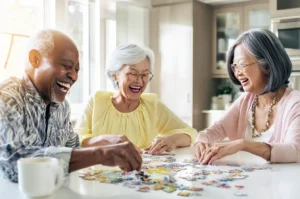
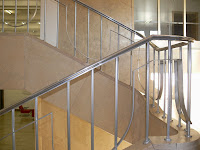


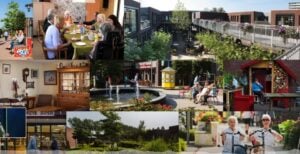




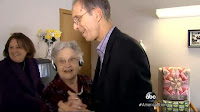
I hope this may help the seniors in lock down I am also one of them been lock down and 86 years old I have posted a number videos on youtube for everybody to see and enjoy of the 'oldies' songs with music and the words to enable the people to assist with the various singers that are well known back in the 30 40 and 50 log in to TOMODON1933 or Tomodonnell